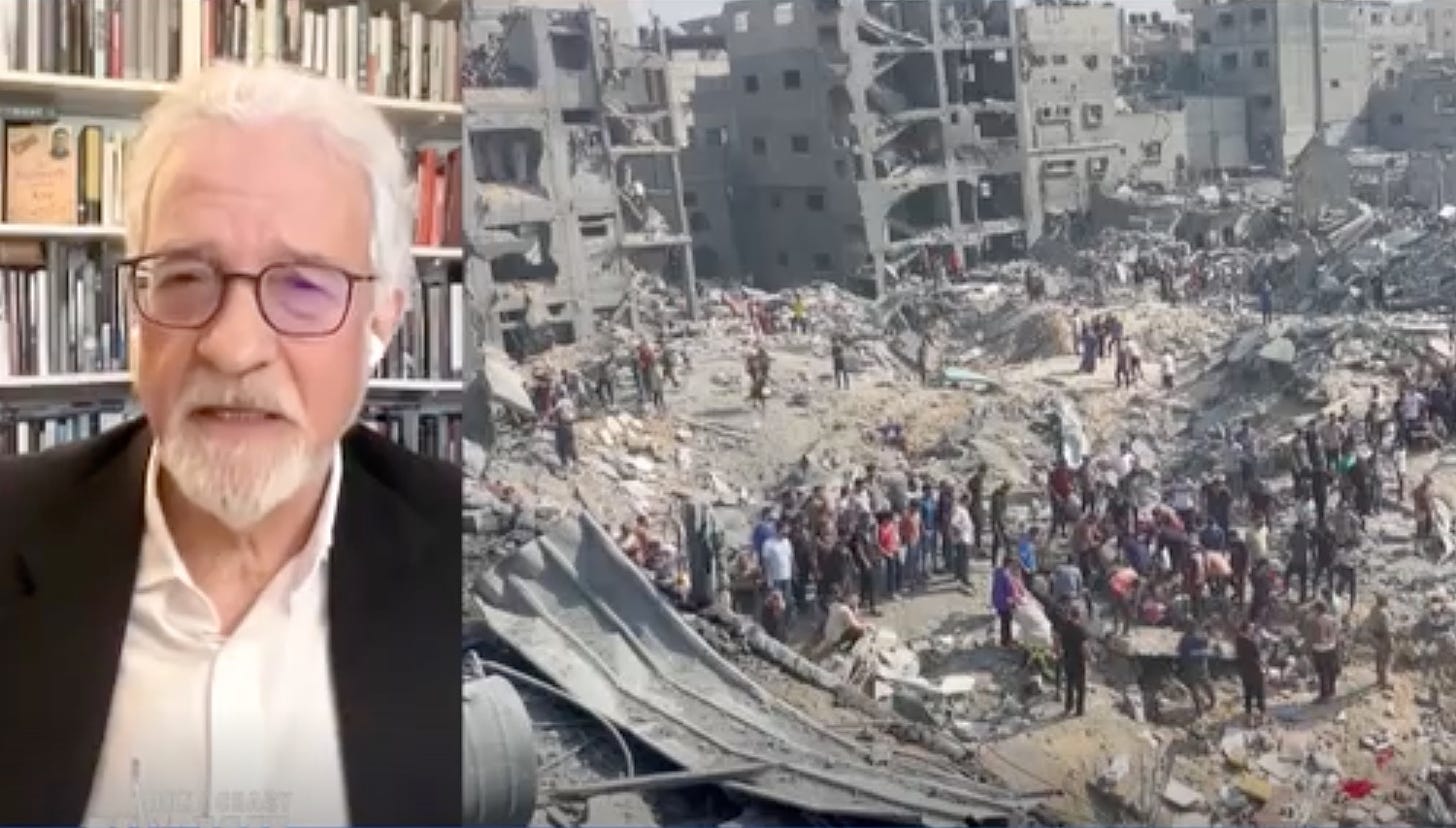Autumn in the Huckleberry Mountains, west of Chewelah, WA
The moral squalor of collective punishment
Twenty-eight years ago, on an otherwise innocent spring day, I was mugged by strep pneumonia. It happened quickly, infecting both lungs and inducing a severe blood infection. I knew I was in deep trouble when the usually reliable prescription inhaler I’d been using for years had no effect whatsoever.
The memory of this near-asphyxiation surfaced when the Covid-19 epidemic arrived four years ago. It was painful to imagine anybody struggling for breath in the way I had. But the virus didn’t much care about that, and it was heart-wrenching to absorb the accounts of so many oxygen-starved Covid victims and the efforts of care providers becoming exhausted by their long hours; overwhelmed by the losses to which they bore witness.
Death awaits us all but an awareness of mass suffering and death can overwhelm the psyche, all the more so when children are among the victims. Such as now.
It has been five weeks since the murder of 1,200 Israelis like Hayim Katsman ignited a war against Hamas and an earth-blistering rain of terror upon the people of Gaza. Neither the massacre and hostage-taking on 10/7, nor the seemingly relentless bombardment of Gaza that followed, are forces of nature. This is something that people are doing to each other, meditated acts of violence that have haunted our species for 10,000 years or more. A week ago Saturday I joined hundreds of others on a march through downtown Spokane to protest the aerial demolition of Gaza in retaliation for the 10/7 massacre by Hamas. I don’t often march in protests—I’d much rather talk than chant. But there were many better reasons to march than reasons not to. It was not a hard decision.
“(T)here is beauty to be found everywhere in the world, and it deserves both protection and the right to fluorish, and that is what I most desire for Palestinians and Israelis. The murder of civilians is an enemy to that desire - whether by terrorists as they dance at a rave, or by terrorists as they harvest their olive grove. The kidnapping of children is an enemy to that desire—whether taken at gunpoint from their kibbutz or taken at gunpoint from their village. And, collective punishment is an enemy to that desire, whether it involves demolishing one home, or one thousand; as too is ethnic cleansing; as too is occupation; as too is apartheid.” —From resignation statement of former senior U.S. State Department officer Josh Paul, October 18, 2023
Not my fist-bump, not my bear hug
A reason I’d voted for Joe Biden in 2020 was his vow to put human rights at the fore of American foreign policy. But there he was, a year and a half later exchanging a fist bump with Mohammed bin Salman on a visit to the Middle East.
“Shameful,” said Fred Ryan, the publisher of the Washington Post, for whom Khashoggi was a regulator columnist. To which Rep. Adam Schiff added: “If we ever needed a visual reminder of the continuing grip oil-rich autocrats have on U.S. foreign policy in the Middle East, we got it today. One fist bump is worth a thousand words.”
I couldn’t think in words about the Biden/bin Salman fist bump. I did think about how Jamal’s widowed fiancé—Hatice Cengiz—must have felt. When she responded, she wrote in Khashoggi’s voice from the grave: "Is this the accountability you promised for my murder? The blood of bin Salman’s next victim is on your hands.”
I thought of Khashoggi again in mid-October, after President Biden walked down the stairs from Air Force 1 at the airport in Tel Aviv and physically embraced Israeli Prime Minister Benjamin Netanyahu.
If the main purpose was to show solidarity and compassion for the Israeli people, surely there was someone other than Netanyahu to embrace. Not only has the bellicose prime minister been an obstacle to peace among Israelis and Palestinians, he has been indicted for fraud and accepting bribes. His criminal trial is still underway. It was only months ago that his efforts to consolidate power by disempowering Israel’s supreme court touched off the largest demonstrations in Israel’s history.
Media accounts explained that Biden’s main purpose in holding the embattled prime minister close was to try to restrain the violence of the Israeli military response. But this has been all hug and no consequences. Even Biden has openly admitted his frustration. Thus the voice of America to Palestinians in Gaza comes in lethal explosions and what Netanyahu calls “collateral damage” — a term that gained infamy by its use to rationalize civilian casualties during the Vietnam War. Each year the U.S. sends billions of dollars in aid and weaponry. On paper, at least, the aid is conditioned upon compliance with international legal protections for non-combatants.
Omer Bartov and a photo of a cratered refugee camp in Gaza from “Democracy Now” broadcast on November 10th.
Omer Bartov, a former Israeli Defense Force soldier who became a leading scholar on genocide and the Holocaust now warns that “the possibility of genocide is staring us right in the face.”
In mid-October Josh Paul, a senior State Department official, resigned in protest. He condemned the 10/7 attack by Hamas as the “monstrosity of monstrosities” and yet he is bitterly critical of the Biden Administration’s approach, what he casts as “blind support” for Israel at the expense of Palestinians. He is especially critical of what he sees as clear human rights violations by Israel that—under U.S. law—should have led to the cut off of military assistance.
Paul’s resignation message is worth reading in full because he speaks to the history of the Israeli/Palestinian conflict and his direct experience in the region. For those who’d like to dig deeper, I’d recommend the exploration Ezra Klein has convened in the past month at his large, on-line large space (audio and transcripts) at The New York Times. It is a brave and, at times, emotional examination. It is deep and rounded; it makes room for the existential fears of Israeli Jews, and the decades-long frustration of those whose non-violent efforts to address Israeli occupation, human rights abuses and inhumane living conditions have proven fruitless.
Among the piercing voices (and there are many) is that of Peter Beinart, the editor-at-large for Jewish Currents. Beinart is a prominent American journalist, a practicing Jew, who has long opposed and protested Israeli policy toward Palestinians. Over the past month he has been especially outspoken about the displacement and death toll of non-combatants in Gaza, especially the more than 4,000 children killed, thus far, during the Israeli onslaught.
This tragedy is still unfolding and it is disheartening to see how quickly American credibility has been damaged at a time in world history where the very idea of democracy is under attack, at home and abroad. To much of the world—including millions of Americans—Biden’s misguided embrace of Netanyahu became a blank check of American support for the collective punishment of Palestinians for the actions of the Hamas terrorists. The horror of 10/7 quickly became the horror of the days since. It was shocking to see and experience how that happened, and is shocking, still, even as we’re so divided on whether to see it, or half see it, or just look away.
—tjc







